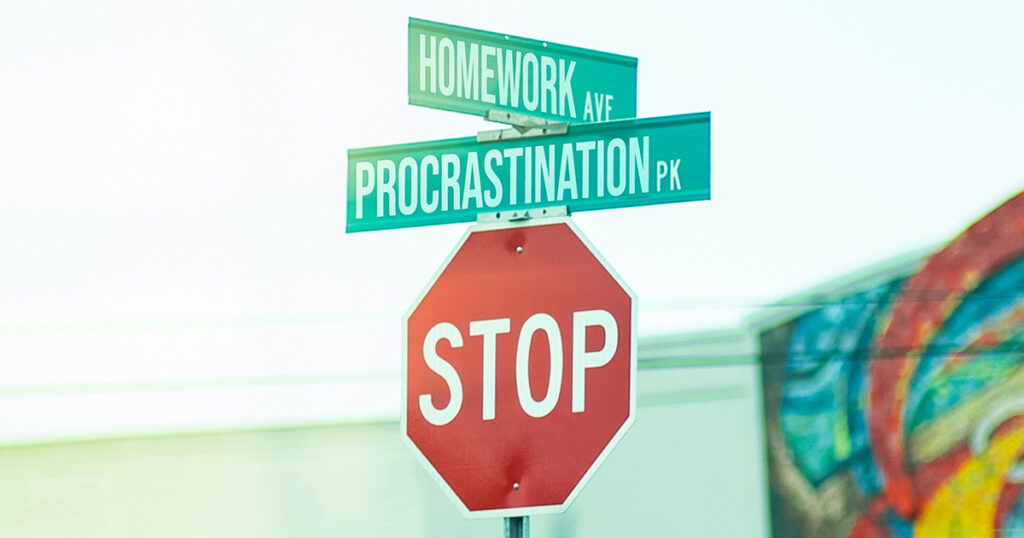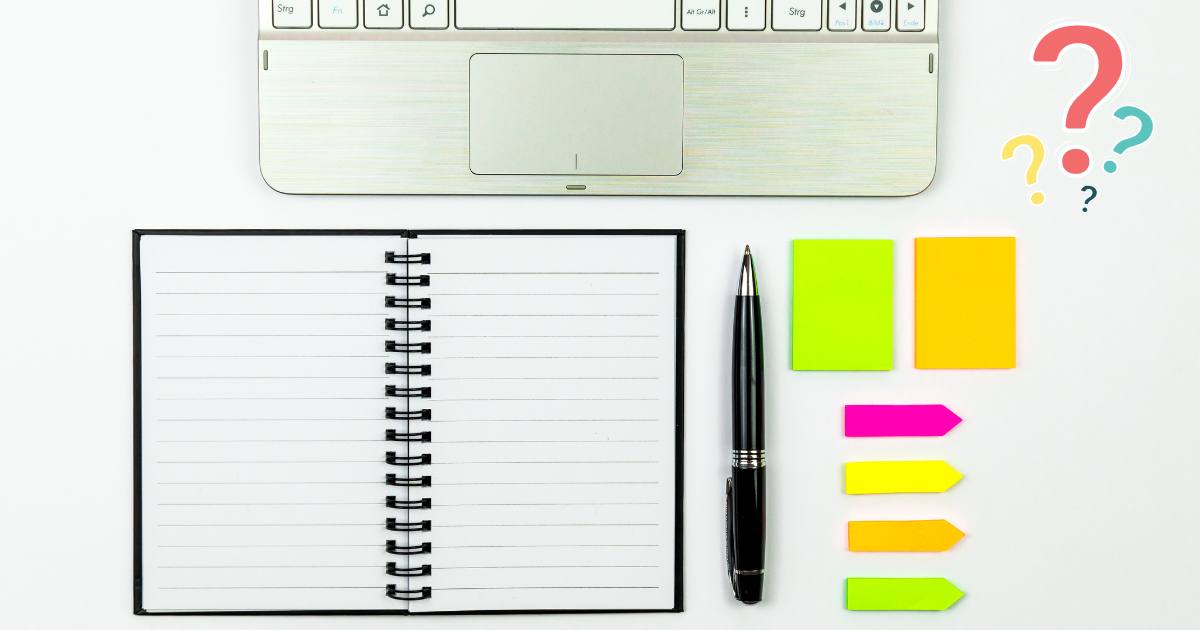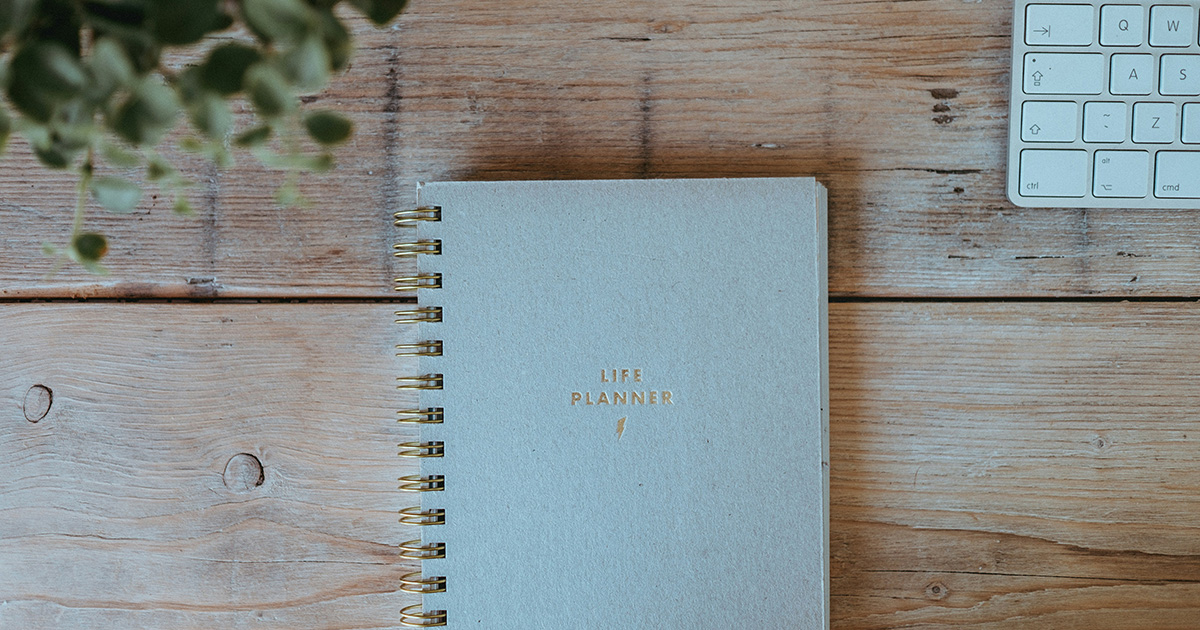Myth: Procrastination = Laziness.
Truth: You can be a straight-A student and still struggle with procrastination.
So, if laziness isn’t the main culprit, why do we procrastinate?
- We feel overwhelmed. Starting college means encountering new, sometimes intimidating experiences — essays on unfamiliar topics, presentations outside our comfort zones and entire courses on subjects that aren’t our preference. Our natural defense against things that overwhelm or intimidate us? Avoid them!
- We’d rather do something more “interesting” or “fun.” Sometimes Netflix, social media or that novel you can’t manage to put down are simply easier to invest in than your college commitments. The catch is this: tackling procrastination head-on by taking care of your responsibilities first gives you more free time to enjoy your favorite RPG or sporting event.
- We’re afraid to fail. Great grades take effort! In fact, psychology shows that maintaining straight As in a class is nearly as stressful as being away from home for the first time. Fear of failure can cause us to put things off until later — or until it’s too late.
- We’re simply exhausted. Learning to balance your new college responsibilities with your work, health, friends, family and fun can be a challenge. When we’re tired, we lose motivation to work. Not to be confused with laziness, this is our body’s way of telling us to take a break! Unfortunately, this also means that until we recharge, our responsibilities get put on hold.
We’ve identified why we procrastinate, but what is the solution? Here are seven easy ways you can turn the tables on procrastination during your very next assignment!
1. The Five-Minute Rule
True fact: The only way to get something done is to just get started!
A foolproof way to make progress on any assignment is to set your cell phone timer for five minutes. Commit to working on that task for only five minutes. When the timer goes off, you’re done.
It takes about five minutes to really get your brain engaged in your work. By the time the five minutes are up, you’ll likely be invested enough to work a little longer — finishing that paragraph or solving that final equation.
Even if you choose to stop after five minutes, you’ve made more progress on the assignment than you would have otherwise. It’s a win-win!
2. Start with the Easiest Part First
Oftentimes, procrastination is our brain’s natural defense against something overwhelming, such as:
- An intimidating set of algebra equations
- A research paper
- A 10-minute presentation in speech class
Tackling the easiest part of the task first can help you “just get started” by identifying a less threatening place to begin.
- Instead of the more difficult equations, begin with the easiest or most familiar one
- Instead of writing a rough draft of a research paper, begin with the cover page
- Instead of outlining your entire presentation, begin by picking the topic
3. Break It Down in Pieces
What’s your favorite dessert? Apple pie? Triple-chocolate cake? If someone set it in front of you, you wouldn’t cram the entire thing in your mouth — you’d choke! Instead, you’d take one bite at a time.
Tackling an assignment — especially a big one — should be no different. Don’t try to complete the entire task in one sitting — your brain will choke, thinking it’s too big a job to handle! Instead, take small “bites” out of the task and separate those “bites” by an appropriate number of hours or days.
One way to break down a big task into smaller tasks is to create a daily to-do list, where each day brings you closer to your end goal. For example:
Assignment: A 10-minute presentation due in two weeks
- Day 1: Choose a topic
- Day 2: Write the hook and closing statement
- Day 3: Compile a list of five professional references
- Day 4: Write the outline
- Day 5: Create half of the PowerPoint
- Day 6: Create the other half of the PowerPoint
- Day 7-14: Rehearse the presentation six times per day
4. Minimize Distractions
You’re on your laptop, looking for a reference for your essay when — ding! — your phone sounds with a notification. Somebody commented on your Instagram photo. Better check that….
Thirty minutes later, you’re watching a cat play piano on YouTube — and your essay isn’t any closer to being done.
Whether it’s your noisy younger sibling, a cell phone notification or the temptation of the Internet being a click away, it’s easy to get distracted to the point of procrastination.
Minimize distractions by:
- Completing your assignment in a quiet location, like your campus library
- Setting your phone out of reach and turning off sound notifications
- Turning off your Wi-Fi so you can’t get online
- Wearing headphones to drown out noise
- Asking your friends and family not to disturb you during your hour of study time
5. Work in the Morning, Study in the Evening
After a long day of classes, nothing sounds better to our weary brains than plopping down on the couch for an evening of Netflix. Procrastination caused by exhaustion can be a major hindrance to our productivity.
Our brains are sharpest in the early part of the day and more receptive to reflection and connecting concepts through studying in the evening. Besides, getting your assignments done first thing in the morning guarantees you won’t have to work on them later when your brain needs a break.
6. Envision the Future
If you find yourself at the crossroads of indecision, take one minute to reflect on the possibilities.
What will the near future look like if you don’t work on a task now?
What will it look like if you do work on it now?
- “I have an essay due on Monday, and today is Thursday. I have four days to complete the assignment. But my friend might possibly invite me to go to Disney World this Saturday. If that happens, I’ll only have Friday and Sunday to work on the essay. Will that be enough time? I’d better get a head start on the essay today, just in case I have less time than I think. I definitely want to have enough free time to go to Disney!”
- “This reading assignment is due tomorrow. I could put it off until tomorrow morning and do it before class. If I do that, I may be rushed tomorrow morning and feel more stressed than usual, which wouldn’t be good for my mental health — especially because I have an exam that afternoon. I want to be as clear-headed as possible. I’d better see if I can get at least half of the reading assignment finished this evening.”
View not procrastinating as an act of kindness to yourself, knowing you’ll feel less stressed, more open to unexpected opportunities and more in control of your day if you choose to “just get started.”
7. Reward Yourself
It’s much easier to work toward a goal when it has a reward attached. Choose rewards that have meaning to you, and remember to follow through on your commitments. Set specific rules about how you obtain a reward in exchange for the work you accomplish.
- “If I study chapters 8-12 for one hour over the next week and score an A- or higher on my Biology midterm, I’ll treat myself to sushi.”
- “After writing two pages of my research paper, I get to play an hour of my favorite video game.”
- “I’m going to give my cell phone to someone I trust and ask them not to return it to me until 8 PM, after I’ve finished my homework for World Religions class.”
Looking for more time management and studying tips? Don’t procrastinate! Visit the Career Center web page today to watch on-demand workshops and more.




